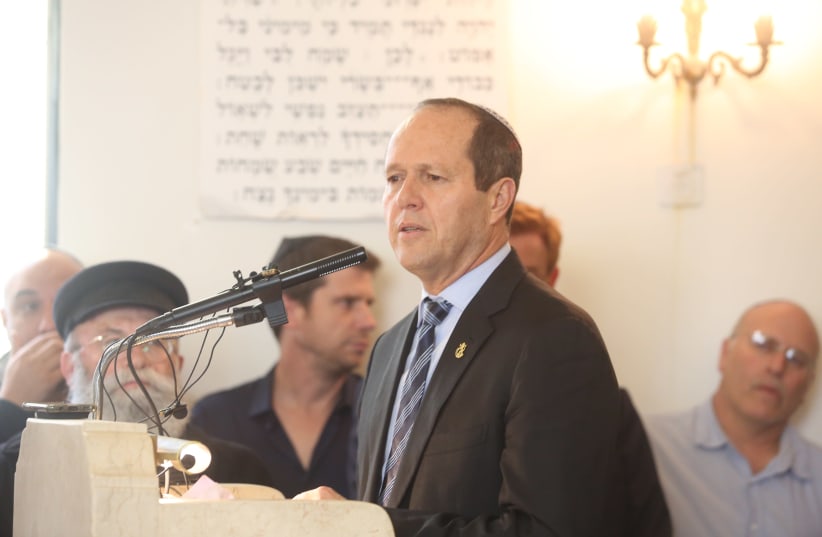■ AT THIS time of year, observant Jews start worrying about what is kosher for Passover in terms of processed foods at supermarkets and cosmetics. Happily, most Israeli wines are kosher for Passover all year round, so that’s one less problem in the kitchen.
Regarding the kitchen, there are various theories on how to kasher it for Passover. Some people go overboard and purchase plastic sinks to place inside their regular sinks. Many cover all kitchen surfaces including refrigerator and cabinet handles with aluminum foil or with nylon. Some people even have a separate stove for Passover and a separate dishwasher. Yeshiva boys put up notices all over the city offering to clean kitchens and kasher stoves and ovens – for a price of course. It’s different strokes for different folks. North African Jews eat rice on Passover. Ashkenazi Jews don’t. Hasidic Jews don’t eat matzah balls and don’t allow the matza to come into contact with any liquid. Other than the Chief Rabbinate and the various haredi kashrut institutions, the most authoritative source for Passover products and the kashering of pots and pans is the Orthodox Union. Rabbi Yissachar Dov Krakowski, the rabbinic field representative of OU Israel Kashrut, will lead a seminar regarding Passover kashering and products, at the OU Center 22 Keren Hayesod Street, on Sunday, March 31 at 8 p.m.
By the way, new immigrants to Israel should be aware that they don’t have to go to the trouble of kashering their pots and pans at home. Many Orthodox synagogues prepare a huge cauldron of boiling water into which the clean pots and pans are lowered in a net container, and held there for a few minutes to relieve them of any unseen surface residue of leaven.
■ FOR THE first time in its history, the Hebrew University has appointed a woman as Dean of the Faculty of Law. The honor has been bestowed on Prof. Daphna Lewinsohn Zamir, who was a cum laude LLB graduate in 1986; and a summa cum laude LLD in 1994. Her fields of interest are property law and theory, behavioral law and economics and experimental legal studies. She has been the recipient of numerous awards and prizes and has been a visiting professor at New York University Law School, Georgetown University Law School and Chicago University Law School. Her appointment is the second successive historic move in the law faculty. She succeeds Professor Michael Karayanni, the first Israeli-Arab to be appointed dean of the university’s law faculty. A Greek Orthodox Christian, Karayanni and his family live in the mixed Arab-Jewish village of Neve Shalom. Lewinsohn Zamir is due to take up her new position at the start of the new academic year.
She will be the 26th dean of the Law Faculty.
■ EVEN THOUGH he was a shekel-a-year mayor, it would seem from a report in Yediot Yerushalayim, that Nir Barkat will cost the Jerusalem Municipality somewhat more than a shekel. While still mayor, Barkat abolished a land grant in the Tel Arza neighborhood to a not-for-profit organization founded by the late Rabbi Yaakov Yosef, the son of the late Shas spiritual mentor Rabbi Ovadia Yosef. The land was intended for the construction of a synagogue. The organization, which goes by the name of the Vision of Yaakov Yosef, petitioned the Jerusalem District Court, where it was represented by Barkat’s nemesis, attorney Yossi Havilio, the former legal counsel of the municipality and today a city councilman. When the organization, together with two other not-for-profit organizations, received the land grant, there was no talk of a possible cancellation. Havilio argued that Barkat had no right to abrogate the grant, because the recipients had not been given an advance hearing. He also argued that Barkat had waited too long to make such a decision, as the organization had already received a building permit from the municipality itself and preparatory construction was already underway. The court accepted these arguments, ruling that Barkat’s decision was to be nullified. The municipality was ordered to pay NIS 10,000 in court fees.
This was not the only piece of unfinished business that Barkat left behind. The municipal committee for names and symbols had decided to name a city square in memory of Shmuel Ben Artzi, the father of Sara Netanyahu. Current legal adviser Eli Malcha said that it was not a god idea because the timing was too close to the Knesset elections. The committee chose to go ahead regardless, but Barkat, realizing the implications, froze the decision until after the elections, at which time the last word will be that of Mayor Moshe Lion.
